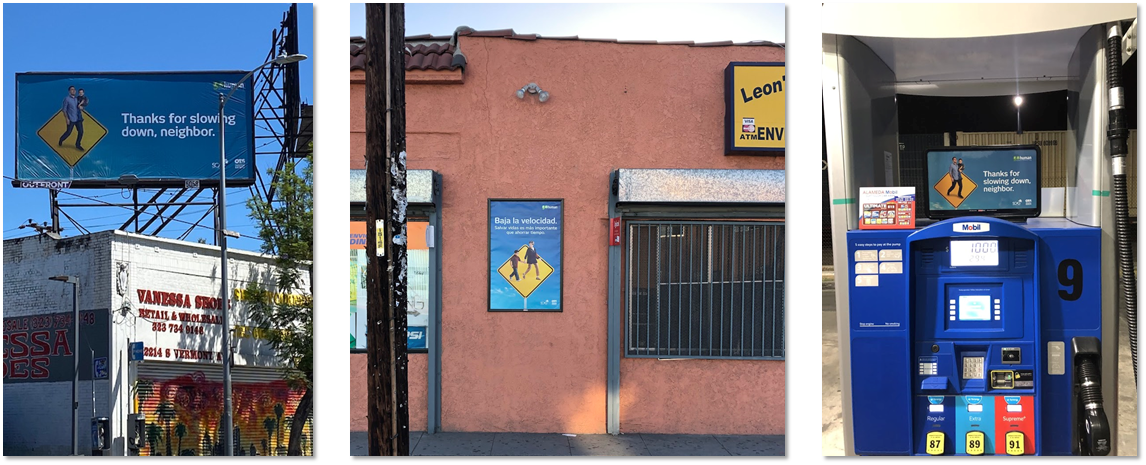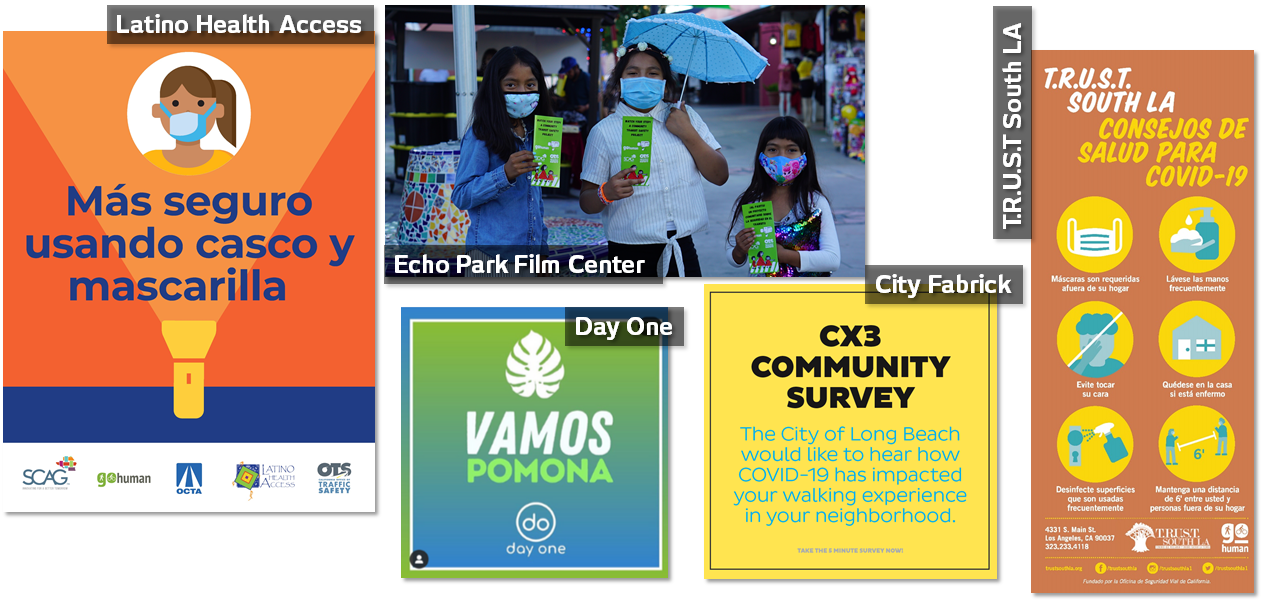2020 Year in Review

As 2020 comes to a close, Go Human hopes to continue facilitate helpful resources during these challenging times. With the goal of supporting communities during the ongoing pandemic, Go Human partnered with community members, nonprofit organizations, cities, and local agencies throughout the region to create safer and healthier places through education, advocacy, resource sharing and projects. Thanks to the California Office of Traffic Safety, the Mobile Source Air Pollution Reduction Review Committee and all of our generous funders for supporting meaningful work across the region this year.
Here are some highlights we are particularly proud of from 2020.
Regional Advertising and Co-Branding Partnerships
Our co-branding partnerships supported traffic safety messaging, education, and encouragement across the SCAG region, through a regional advertising campaign, targeting High-Injury Network and Disadvantaged Communities. In 2020, Go Human:
- Revamped our safety messaging based on message-testing and community feedback.
- Ran targeted ads in English and Spanish throughout August 2020 on billboards, bus shelters, gas pumps and other strategic placements, reminding drivers to slow down.
- Reached over 328 million impressions across six counties.
- Motivated 1 in 5 Southern California residents to drive safely (based on 600 surveys).
- Co-branded and distributed safety materials to 20+ partners.
- Achieved more than 1.3 billion impressions to date.
- Secured Safety Pledges from 55 partners or jurisdictions committing to safety strategies.
 Go Human public signage samples.
Go Human public signage samples.
Resilient Streets Toolkit and Kit of Parts
To address the safety concerns of the COVID-19 pandemic, Go Human has used a framework for resilient streets, which promotes the community-driven use of street space for community resiliency, recovery, and resource delivery that prioritizes disadvantaged and vulnerable communities. Go Human created a Resilient Streets Toolkit as a resource for project implementation. Designed to help jurisdictions and communities design and implement viable community-driven Resilient Street projects, the Toolkit identifies community engagement strategies, ways of adapting Go Human’s Kit of Parts into different project types, and potential funding sources.
 Priority areas of the Resilient Streets Toolkit.
Priority areas of the Resilient Streets Toolkit.
Go Human’s Safe & Resilient Streets Mini-Grant Program
In July, Go Human awarded more than $210,000 to 28 projects across the region. Reaching over 76,000 people across Southern California, awarded projects spanned a wide range of creative engagement activities that prioritized the mobility and transportation needs of those most impacted by COVID-19 and worked to:
- Identify emerging mobility and safety issues in local communities.
- Educate and engage communities on safe practices.
- Increase access to safe routes for vulnerable street users.
- Envision safety improvements to transportation infrastructure that prioritizes local vulnerable street users.
Specific projects included:
- Storytelling radio series focusing on transit.
- Virtual workshops for youth.
- Free bike match and repair for essential workers and families.
- Co-creation of community resilience and safety resources.
- Temporary safety demonstration projects.
- Meal distribution paired with safety education.
- Among many other creative and impactful projects.
Listening Session
To strategically shape these programs in alignment with local community needs, and in response to the impacts of the pandemic, Go Human held a Community Listening Session on Oct. 19 to provide the public opportunity to shape strategies in 2021. More than 27 representatives from across the region provided substantive feedback which directly informed upcoming strategies.
Safe, Resilient & Locally Grown: A Traffic Safety Series
In November, SCAG and the Go Human team, alongside AAA of Southern California hosted a two-part webinar series, Safe, Resilient & Locally Grown: Community-Based Traffic Safety Solutions During a Pandemic. Part I was titled Exploring Pandemic-Era Data Trends & Policy Implications and Part II was titled Building Partnerships & Generating Support. With over 175 participants, panelists and attendees explored innovative, resiliency-focused strategies for improving traffic safety conditions while reducing COVID-19 transmission. Panel moderators were Los Angeles Walks and Public Matters, and panelists included AAA of Southern California, Safe Transportation Research & Education Center (SafeTREC), City Fabrick, 3 Revolutions Future Mobility Program, Council Member Arlis Reynolds of Costa Mesa, FastLinkDTLA, California Transportation Commission, and Central City Neighborhood Partners. Through this sponsorship strategy, Go Human reinvested resources directly into community partners for participation and distributed more than X masks to participants and community members in alignment with our safety efforts.
Looking Ahead to 2020
SCAG is planning a year full of new and continued Go Human strategies in 2021! We’re growing the ways you can join the campaign. A preview of 2021 activities below:
- Go Human’s Community Safety Ambassador Cohort Program, a participatory and experiential planning and leadership series.
- Safe and Resilient Streets Mini-Grants, which fund local projects led by community-based organizations.
- Sub-Regional Safety Peer Exchange Program, a series of community-informed virtual sessions for stakeholders and practitioners addressing traffic safety.
- Co-Branded Safety Advertisements, print and digital graphics provided at no cost to jurisdictions who have committed to the Go Human Safety Pledge.
Follow SCAG’s Go Human campaign on Facebook, Twitter and Instagram to make sure you receive the latest details about upcoming events, campaigns, and opportunities. For questions or to request resources, please reach out to Andrés Carrasquillo at carrasquillo@scag.ca.gov.
